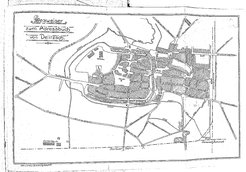The Delitzsch Project – Class Structures and Networks in a German Small Town before Hitler came to power
The Delitzsch-Project – Class Structures and Networks in a German Small Town before Hitler came to power
My sources: More than 300 registry records
My sources consist of more than 300 registry records from 1870 to 1934 including marriage registers; membership lists of associations, parties, and other clubs; parish registers; address books; etc. The record entries will be combined in a database, which currently comprises more than 30,000 persons.
My empirical approach: Combining classification systems and network analysis
The empirical instrument that I develop means extending social structure analysis by combining it with the central principle of network theory: The “strength of ties”. The idea of the concept is that relationships differ in strength. Married couples usually have a stronger relationship to one another than members of a club or association, who again have a stronger bond to one another than involuntary school mates or neighbours or perhaps signatories of a petition who do not know each other personally.
With such a hierarchy of relationships, it is possible to create individual relation profiles of each class within the classification scheme. Furthermore, it can be precisely measured to which extent people set up groups according to these classes, at which relationship levels, and of course if they did so at all
(for a detailed description of this model click here).
My Ph.D. supervisor
Georg Fertig is professor for Economic and Social History at the Martin Luther University of Halle-Wittenberg. His research focus lies on historical demography and rural history.
My student assistant
Robert Nasarek studies History with a focus on Social History as well as International Area Studies. To date, Robert has entered several thousand register entries written in old German handwriting into the project database.
Cooperation
I collaborate with the Municipality of Delitzsch, the state archive in Leipzig (Staatsarchiv Leipzig), and the Association of Computer Genealogy (Verein für Computergenealogie).

Map of Delitzsch in 1907
© Museum Barockschloss Delitzsch
